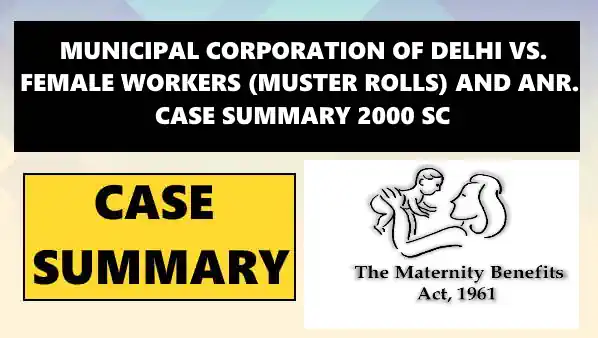Municipal Corporation Of Delhi VS. Female Workers (Muster Rolls) And Anr gives an answer whether the female workers (muster rolls) is entitled to maternity leave or not just like the regular female workers.
BENCH: S. SAGHIR AHMAD AND D.P. WADHWA
MUNICIPAL CORPORATION OF DELHI JUDGEMENT DATE: March 8th, 2000
MUNICIPAL CORPORATION OF DELHI CITATION: AIR 2000 SC 1274: (2000) 3 SCC 224
MUNICIPAL CORPORATION OF DELHI CASE FACTS:
- The female workers who were on the muster roll demanded maternity leave just like the regular employees, but were denied to them because their services were not regularized.
- Their case was supported by the Delhi Municipal Workers Union (Union) and, it was referred by the secretary (labor), Delhi Administration, to the industrial tribunal for adjudication.
- A claim was filed by the Delhi municipal workers union stating that the Municipal Corporation of Delhi provides employment to many employees and female workers (muster roll) and they are made to work in that capacity for years and also the nature of duties and responsibilities performed by them are same as those of the regular employees and the denial of the maternity benefits to the female worker on muster rolls shows a dismissive attitude of the corporation.
- The corporation pleaded in the written statement that the maternity benefits act does not apply to female workers on muster rolls as they were engaged on daily wages.
- On 2nd April 1996; the tribunal allowed the claim of the female workers on muster rolls and directed the corporation to provide maternity benefits to them under the maternity benefit act.
- The corporation challenged the decision of the tribunal before the Delhi High Court, which was dismissed by a single judge on January 7, 1997.
- Then the corporation filed letters of patent appeal to the supreme court, but the division bench dismissed it on the grounds of delay. But the corporation stated that the division bench was not justified in dismissing the matter on the grounds of delay.
- Then the division bench expressed themselves on the merit of the case as the question involved in the case was important.
ISSUES:
- Whether the female workers on muster rolls are liable to claim maternity benefits under the Maternity Benefits Act, 1961?
CONTENTIONS:
MUNICIPAL CORPORATION OF DELHI’S CONTENTION (PETITIONER):
- Corporation pleaded it does not entitle female workers on muster rolls to maternity benefits under the Maternity Benefit Act. It further stated that it does not entitle them to any benefit under Central Civil Service (Leave) Rules.
- It also contended that they were not entitled to any benefit under the Employee’s State Insurance Act, 1948.
- Further, the learned counsel for the corporation contended that the appeal rejected by the division bench is not reasonable on the ground of delay, which has been condoned as there was only 33 days’ delay in filing letters patent appeal.
FEMALE WORKER (MUSTER ROLL) CONTENTION (RESPONDENT):
- Female workers on the muster roll demanded a grant of maternity leave, which was granted to the regular employees and was denied to them as their services were not regularized.
- The union for the female workers on muster roll further contended that the Municipal Corporation of Delhi recruits the workers, including female workers (muster rolls) against the work of continuing nature.
- It further stated that the duties performed by female workers in muster rolls are like the regular female workers, so it entitled them to the benefits which are provided to regular female workers, and denying the benefits shows a negative attitude of the corporation.
RATIO DECEDENDI:
- JUSTICE S. SAGHIR AHMAD AND D.P. WADHWA: Article 14 of the constitution states that no person will be denied equality before the law or equal protection of the law. So, the labor belonging to any sector is equal before the law.
- The bench further stated that under Article 39 of the constitution, certain policies are to be followed by the state to secure that men and women have equal rights to livelihood and that there is equal pay for work by both men and women.
- The bench also states about Article 42 and Article 43 of the constitution; article 42 talks about just and humane conditions of work and maternity relief and that the validity of executive action on denying it will be examined on the basis of article 42 of the constitution. Article 43 speaks about living wage etc for workers to ensure a decent standard of living.
- The bench further talks about the Maternity Benefit Act, 1961, which aims to provide facilities and benefits to working women in a dignified manner so that they can overcome motherhood in a peaceful manner.
- They further talk about Article 11 of the Convention on the Elimination of all forms of Discrimination against Women, which states that the state must take all appropriate measures to abolish the discrimination against women in employment.
DECISION:
- The division bench in the Honorable Supreme Court dismissed the special leave petition.
- It held that principles stated in article 11 of the convention on the elimination of all forms of discrimination against women have to be read along with the contract of service between the Municipal Corporation of Delhi and female workers (muster rolls).
- The female workers on muster rolls become entitled to maternity benefits under the Maternity Benefits Act, 1961 regarding the Article 39 and 42 of the constitution.
- Thus, the court further stated that all female workers, including female workers (muster rolls), are entitled to maternity leave 6 weeks before and after the delivery.
CONCLUSION:
- The conclusion drawn from this case is that all the workers are equal in the eyes of law and also the female workers, whether they are engaged on muster rolls or are regular employees.
- It entitled female workers to maternity benefits under the maternity benefits act, 1961. The fundamental rights of female employees are protected by enacting maternity laws and denying will be considered a violation.
Found Municipal Corporation Of Delhi VS Female Workers (Muster Rolls) Case summary useful? We have a bunch of useful topics from labour law that will help you in your preparation here >>> LABOUR LAW
Check out our YouTube Channel for free legal videos >>> LAW PLANET YT





